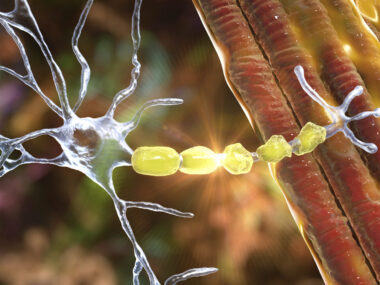National MS Society awards $4.6M to 5 projects on repairing myelin
Researchers' work ultimately aims to restore lost function in MS patients
Written by |

The National Multiple Sclerosis Society is awarding a total of $4.6 million in funding to advance research into how the protective myelin sheath that’s damaged in multiple sclerosis (MS) can be repaired — a step toward developing new treatments for the disease.
Five research projects have been chosen for funding: four in the U.S. and one in Spain. Each aims to better understand how to repair myelin and protect nerve cells, or to develop tools to improve preclinical and clinical studies in these areas.
The ultimate goal is to help MS patients recover lost function — motor as well as cognitive, and targeting impaired vision and pain and fatigue.
“These projects may accelerate our ability to develop new treatments that restore function in people living with MS,” Bruce F. Bebo, PhD, executive vice president of research at the National MS Society, said in a press release from the nonprofit announcing the awards.
The funding aligns with the goals of a broader initiative from the National MS Society known as the Pathways to Cures Research Roadmap. That recently updated strategic framework was developed to identify and address gaps in current MS research. Among the three identified areas of research, these funded projects are particularly focused on the pathway of restoring lost function.
National MS Society funding aligns with its Pathways to Cures Roadmap
MS is caused by a misguided immune system inflammatory attack that’s launched against the myelin sheath, which protects nerve fibers and is key for transmitting nerve signals efficiently. The resulting loss of myelin, called demyelination, impairs nerve cell communication and ultimately leads to a range of MS symptoms such as fatigue, numbness and tingling, pain, vision problems, and walking impairments.
One way to treat MS could be to restore lost function by repairing myelin, a process called remyelination. Still, while many therapies are now approved for MS, none has been able to achieve this.
“Although we’ve made progress in studying myelin repair using animal models, we haven’t yet been able to successfully translate these findings to clinical trials,” Bebo said, noting that “additional approaches are needed.”
To better understand remyelination, Meredith Hartley, PhD, and her team at the University of Kansas are taking on a project to investigate the role of cholesterol, a component of myelin.
Many proteins are involved in how cholesterol forms and breaks down. The researchers will block or use genetic engineering to delete those proteins, and then check whether they could be targeted to boost cholesterol recycling, and therefore promote remyelination.
“In the future, therapies could be developed against these targets and provide a novel way to restore lost function in people with MS,” the team wrote in the project’s abstract.
Although we’ve made progress in studying myelin repair using animal models, we haven’t yet been able to successfully translate these findings to clinical trials. … Additional approaches are needed.
Another funded project, by Jeffrey Huang, PhD, of Georgetown University, will test whether blocking a transporter of amino acids (the building blocks of proteins) can ease the chronic inflammation in the brain that’s believed to prevent normal remyelination processes from taking place.
At Johns Hopkins University, Michael Kornberg, MD, PhD, will explore changes in fat metabolism that may affect the myelin repair abilities of myelin-producing cells. According to Kornberg’s team, their work has “the potential to identify new treatments to promote myelin repair, which is a critical unmet need for people living with MS.”
For her part, Isabel Perez-Otaño, PhD, at the Alicante Neuroscience Institute in Spain, will focus on a brain protein that may help to activate these cells. Perez-Otaño and colleagues will be testing their theories in mice.
Finally, Paul Tesar, PhD, at Case Western Reserve University in Cleveland, will investigate how astrocytes — star-shaped cells that support the survival of nerve cells — become overly active and contribute to damage in MS. The team will test a class of compounds that prevent the toxic activation of astrocytes.
“Stopping these toxic astrocytes from forming may protect nerve cells, potentially halting or even reversing the disability progression that occurs in people with MS,” the researchers wrote in their project’s abstract.



